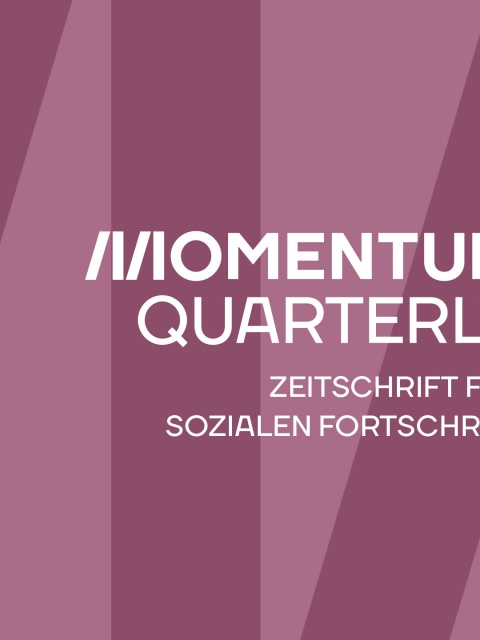
Momentum Quarterly - Journal for Societal Progress
Momentum Quarterly is a transdisciplinary free open-access scientific journal, aiming to improve the discursive and thematic connection between research and policy practice.
Call for Papers: „Gender, Diversity and Social Cohesion in Europe”
The global pandemic of Covid-19 has a wide range of effects on the realities of work and living conditions for many people in Europe. This has become particularly evident for issues concerning gender relations, diversity, and social cohesion, in which the pandemic has acted as a catalyst that intensifies already existing unequal developments: Heterosexual couples with children rely on women’s unpaid work once more for home-schooling and care work; loss of paid work, longer periods of lockdowns or lay-offs have led to financial and psychological problems for adults, youth and children. Aspects of gender and diversity are often displaced due to seemingly ‘more important’ issues in politics. At the same time LGBTIQ* and reproductive rights have been diminished in specific EU member states in the shadow of the pandemic, and Gender Studies has been claimed to be an ideology and not a scientific approach. Studies on unpaid social reproduction and paid work show the unequal development of income and support for working mothers or single parents, while the digitalization of the workplace and home-office have shifted working environments further into the private household, dissolving boundaries of paid and unpaid work, public and private realms. These developments show that concepts of diversity and equality are only meaningful if they lead to a change in legal rights and give recognition to differing social backgrounds, as highlighted in intersectionality studies.
In the wake of the long-lasting impact of the global financial and economic crisis in the global North and South, the global Covid-19 pandemic and its aftermath already shows that global North-South relations will further change and might intensify, and that gender relations and the recognition of diversity not only as a workplace concept but as a vision for further inclusion of intersectional identities remain to be implemented. Once recovery budgets are set in place, a just distribution between economic sectors and the implementation of gender budgeting measures and gender mainstreaming will need further monitoring.
This special issue wants to take these manifold dimensions into account and asks:
- How have gender relations in work, in social reproduction or in state institutions and private organizations changed?
- Which sectors are affected in specific ways due to the pandemic and how have paid work or unpaid social reproduction changed in this context?
- Which role do gender and diversity issues play in the context of the Covid-19 pandemic and the political and economic actions combatting it?
- Have policies and/or ideologies changed or shifted considering gender and diversity issues?
- How are rights and lives of marginalized groups (e.g., LGBTIQ*, POC) affected by the Covid-19 pandemic?
- What effects does the Covid-19 pandemic have on social cohesion in Europe?
- What is necessary to advance social cohesion across Europe and which policies need to be addressed from an intersectional or gender+ perspective?
- How can policy practitioners be involved or intervene in the process of transformative social and political change considering multiple settings and identities?
- What role can recovery budgets play to assure a just distribution between economic sectors, gender budgeting measures, gender relations and the recognition of diversity as a vision for further inclusion of intersectional identities?
- Further questions concerning gender mainstreaming, gender budgets or related research/policy implications and impacts.
The call for papers is open to policy practitioners and researchers alike and open to further topics not yet mentioned above that fit into the scope of the CfP. Please contact the Special Issue editors in these cases if you have questions:
Michael.hunklinger@donau-uni.ac.at and Stefanie.woehl@fh-vie.ac.at
We particularly encourage early career scholars from different regions of the world and policy practitioners to apply as well as marginalized positions in academia.
You may submit your article in English or in German language.
Timeline:
Deadline for abstracts: 30.06.2021 of max. 450 words plus references
Decisions on invitation for full papers sent out: 10.07.2021
Deadline full papers: 30.11.2021
Publishing date: 1.07.2022
All papers will be double-blind peer reviewed and published online open access through our provider Innsbruck University Press in the Open Journal System. Please see our website for author details and manuscript guidelines (word limit, manuscript details etc.):
https://www.momentum-quarterly.org/ojs2/index.php/momentum
We look forward to your abstracts, Michael Hunklinger (Danube University Krems) and Stefanie Woehl (Jean Monnet Chair “Diversity and Social Cohesion in the European Union” at the University of Applied Sciences BFI Vienna)